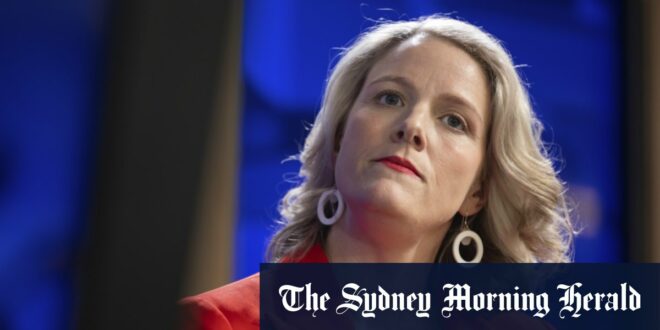And O’Neill warned that initial information after such an event is often wrong: “Before we get into the debate about what happened, it’s really important that we let the law enforcement and national security agencies do their thing.
“Once the picture starts to clear, extremism will likely be part of it.”
loading
As Home Affairs Minister, O’Neill oversees the Australian Security Intelligence Organization and is responsible for cyber security.
“Extremism is nothing new, but it is abundantly clear from events here and around the world that conspiracy theories, misinformation, and disinformation problems are as old as time that technology is causing horrific violence,” she said.
They represent a new kind of threat to national security. There will be very deep and important policy questions for us here in Parliament to reflect on how our country can prevent and deal with violence.
But today is not the day for those discussions. Today is a day of grief.”
O’Neill announced last week that the Department of Home Affairs’ National Resilience Task Force will examine ways to strengthen Australian democracy and combat disinformation and disinformation.
“We need to explore what we can do with technology companies to reduce the spread of polarization and falsehoods, which have become an important part of our lives,” she said.
On Thursday morning, Opposition Leader Peter Dutton, who was home affairs minister in Morrison’s government, agreed that the conspiracy theory activity of those who started the crossfire in Queensland should be a concern for law enforcement in Australia.
“In recent years we have seen the spread of disinformation on the Internet and the way it infects people’s minds and changes their whole personality, their whole perspective, and causes them to commit or at least contribute to their perpetration of extreme acts. [That] “It should be a source of concern for any right-thinking Australian,” he told reporters in Canberra.
Dutton said the opposition would support the government in introducing any measures to make it easier for law enforcement to access encrypted apps, as there is a lot of discussion of conspiracy theories.
loading
“If a court issues a warrant for the arrest of this information, it must be discovered by the police,” he said.
“It’s just a technical issue and we’re allowing these people to express their crazy ideas online.”
Dutton was forced to pause several times during a moving tribute in Parliament to the police officers and civilians killed in Monday’s shooting west of Brisbane.
He said, “The corruption of this incident is what befell her the most.” “In this case, what struck me the most was the execution technique [of the shootings] And complete disregard for humans.”
Earlier, Prime Minister Anthony Albanese said Monday “should have been a normal day” for officers, “a day of warmth, a day of peace”.
“Instead, the day of calm shattered that day with terrible shots,” he said.
Albanese also paid tribute to Alan Dare, a resident of Queensland, who was shot dead after coming to check on his neighbors after the first shots rang out.
He described Dare as “an innocent Australian who paid for his kindness and concern with his life”.
Yesterday, Labor MP Peter Khalil, chairman of the Joint Parliamentary Committee on Intelligence and Security, said that was the case Important for disrupting the ‘pipeline to extremism’ at its source.
“It’s not just at the pointed end of the spear where violent attacks are imminent,” Khalil said.
“The growing polarization and echo chambers of the Internet and the intersection of ideological, transnational, and socio-economic factors have created a feverish atmosphere of radicalization that is challenging for security and law enforcement agencies.”
Originally posted 2022-12-15 13:58:30.
